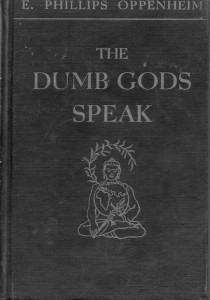Book Review: The Dumb Gods Speak by E. Phillips Oppenheim
In 1937, the dying genius Mark Humberstone bequeaths his marvelous inventions to a Council of Seven to be used in the service of peace. Shortly thereafter, the United States grants independence to the Philippines. When the Japanese attempt to invade the newly freed islands, their entire fleet is rendered inert.
The story proper picks up on April 14, 1947, in Nice, France. This is the headquarters of the mysterious International Bureau, an espionage organization run by Mark Humberstone, Jr. and a man named Cheng. Much rumor swirls around the agency, and the person who calls himself Mr. Jonson has come to join it. Little does anyone outside the agency realize that it is on the cusp of a great coup–the end of war!
This 1936 novel was written by E. Phillips Oppenheim, a prolific author who mostly wrote spy thrillers and is considered one of the founders of the subgenre. This one goes beyond techno-thriller and into downright science fiction territory. The International Bureau uses advanced television (roughly equivalent to satellite TV without the need for satellites) and EMP weaponry; there’s also what appears to be some sort of force field, but that’s only seen as a parlor trick.
The political situation has stayed stagnant (presumably at least in part due to the actions of the Bureau); World War Two never broke out, but Germany is spoiling for a fight (no mention of the Nazis.) About the only major change is that Japan has had to set aside its invasion of the mainland due to its naval disaster, allowing China to catch its breath.
The Bureau’s plan is to turn China and Russia into constitutional monarchies, thus making them strong and stable factors for peace. (Oppenheim was British.) With that, and the demonstration of the full power of the Humberstone devices, war will be impossible. Mr. Oppenheim was clearly not familiar with the concept of guerrilla warfare. He also believed and put into the mouth of a character that without religion as a motivating force, the Russian army would have zero morale and fall easily. (World War Two disproved that; their leaders might have been bad, their supplies inferior, but the Soviet soldier’s will to fight against invaders is unquestionable.)
Period racism and sexism is on display; Prince Cheng’s plan nearly crashes and burns because he failed to take into account that a woman might not want to marry a man she doesn’t love just because he told her to. There’s also some not so subtle anti-Semitism. (One of the villains is mentioned as being obviously Jewish, and there are no other Jewish people in the book.)
Quite a bit of space is devoted to telling us how luxurious the main characters’ lives are, what they eat, the fine wines they drink (they also smoke) and the fancy clothes they wear. Mr. Oppenheim’s books were very much a predecessor to James Bond in these matters.
Humberstone, Cheng and their respective love interests (everyone is kind of surprised to learn that Cheng actually loves the woman he’s marrying) are kind of smug and omnicompetent, except for that one major bump I mentioned earlier. More interesting are Mr. Jonson, who is also an omnicompetent as bodyguard/hitman/stage magician, but his loyalties are unclear for most of the story; and Suzanne, a femme fatale who works for the Bureau, who is very fallible and relatively sympathetically portrayed. (I should mention there are lines in gratuitous French scattered throughout the book without translation, most are easy to figure out from context.)
The actual villains of the story are mostly notable for being completely ineffectual. Mr. Jonson or the Bureau have been several steps ahead of them all along.
The title is explained near the end, when Cheng explains that the gods of China, long silent, seem to speak to him (and possibly through him) to restore the fortunes of his beleaguered country.
Content warning: There are a couple of suicides.
There’s some good writing, but Mr. Oppenheim is trying for more utopian wish-fulfillment than serious thinking about the future; I think you would be better served by seeking out his straight-up spy fiction.


sounds interesting with a very developed alternative world. But – I’m glad you said we should start with his spy novels. I’ve heard of him, but I’ve never read anything by him – maybe in the near future!
See if you can find “The Great Impersonation”–it got made into a movie more than once.
Thanks for the content warning, I can’t seem to handle upsetting content anymore, especially if I read at night.
It is why I mention this sort of thing in reviews. I know there are people who need to know in advance.